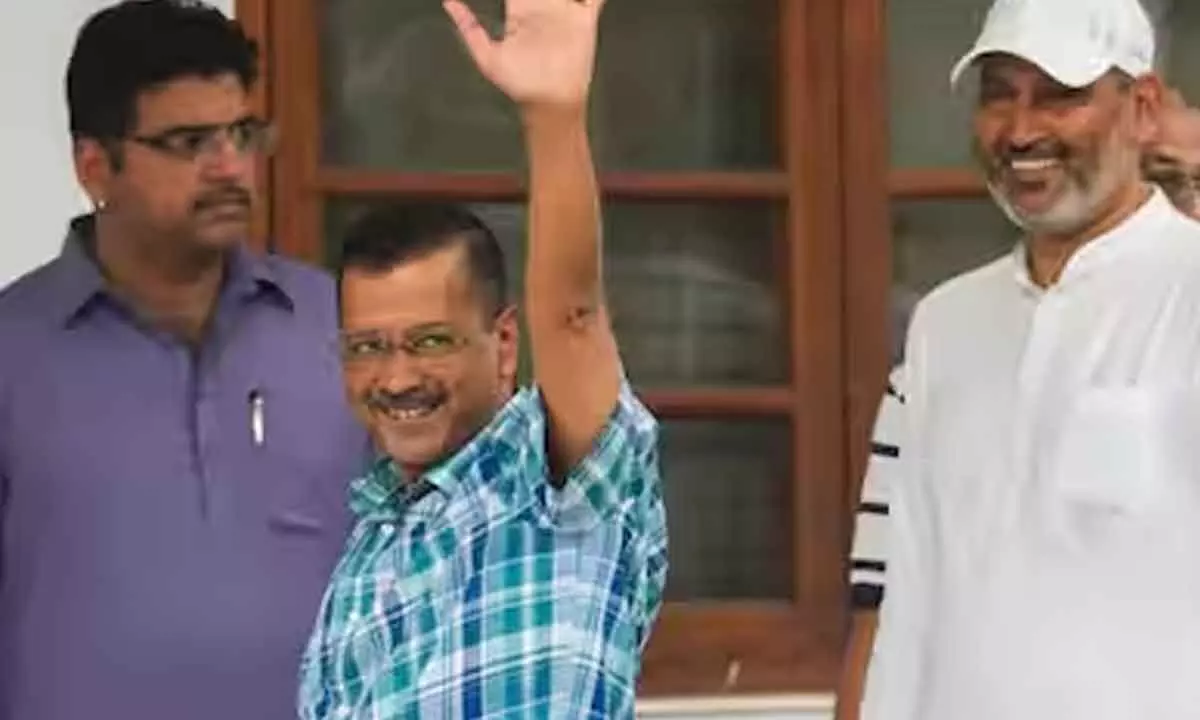Live
- Almonds are a key to faster muscle recovery after exercise: Study
- No govt faced so much criticism than Revanth-led Cong in 11 months: Kavitha
- Balineni signed SECI agreement, says Chevireddy
- Infant kidnapped from Niloufer Hospital rescued, cops arrest 3
- Sunny Leone reflects on challenges and preparations for ‘Shero’
- Hyderabad Saree Festival 2024 kicks off in a grand manner
- Speed up Veligonda project works, CPM urges govt
- 10 career opportunities with a public policy degree
- TG Medical Council cracks whip on fake doctors
- TTD takes up mammoth waste management exercise
Just In
Delhi High Court Halts Release Of Arvind Kejriwal In Money Laundering Case


- The Delhi High Court temporarily halted the release of CM Arvind Kejriwal in a money laundering case, following the ED's challenge to his bail granted by a trial court.
- Kejriwal, arrested for alleged irregularities in the Delhi excise policy, has been in custody since March 21.
On Friday, the Delhi High Court temporarily halted the release of Chief Minister Arvind Kejriwal in a money laundering case brought by the Enforcement Directorate (ED). This decision came a day after a trial court granted him regular bail nearly three months post his arrest in connection with alleged irregularities in the Delhi excise policy.
Kejriwal, in custody since March 21 following his arrest by the ED, had his bail challenged by the ED in the high court. A vacation bench of Justices Sudhir Kumar Jain and Ravinder Dudeja decided that the bail order would not be enacted until the court reviewed the ED's plea later that day.
During a brief hearing, Additional Solicitor General (ASG) SV Raju, representing the ED, requested the court to stay the bail execution, citing insufficient opportunity to oppose the bail at the trial court level. ASG Raju claimed the trial court hastily passed the bail order without allowing comprehensive arguments or the submission of a written opposition.
Kejriwal’s defense, led by senior advocates Vikram Chaudhari and Abhishek Manu Singhvi, highlighted Supreme Court precedents distinguishing bail cancellation from bail grant, asserting that the trial court's decision should remain effective.
The ED's move to the high court occurred less than 24 hours after the trial court’s bail decision. The trial court had denied the ED's request to delay the acceptance of bail bonds, permitting Kejriwal's counsel to submit the bonds the next day.
Arvind Kejriwal, arrested on March 21 for alleged irregularities in the 2021-22 Delhi excise policy, was granted interim bail by the Supreme Court on May 10 for Lok Sabha election campaigning. He surrendered on June 2 after the Supreme Court declined to extend the interim bail.
During the bail hearing, senior advocate Chaudhari argued that the ED failed to prove a money trail linking Kejriwal to any illicit activities, highlighting contradictions and lack of material corroboration in the statements of co-accused. ASG Raju countered, asserting that the ED possessed concrete evidence, including call records, showing Kejriwal’s involvement in the alleged money laundering.
The case against Kejriwal is part of broader allegations of irregularities in Delhi's excise policy, under investigation by both the CBI and the ED. The ED accuses Kejriwal of being the "kingpin" in the alleged corruption scheme.

© 2024 Hyderabad Media House Limited/The Hans India. All rights reserved. Powered by hocalwire.com






